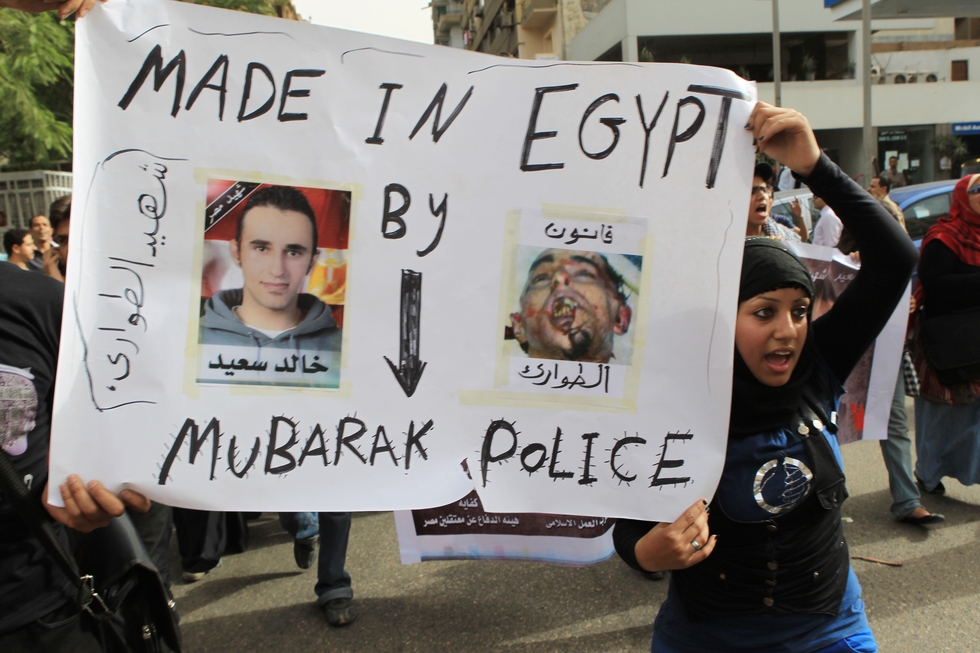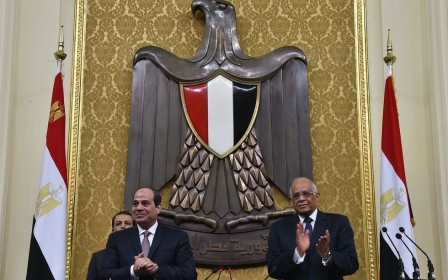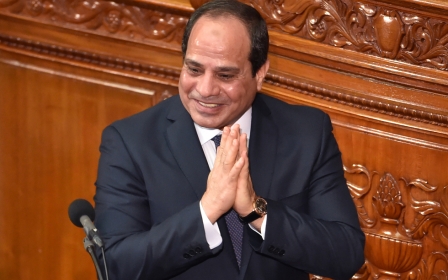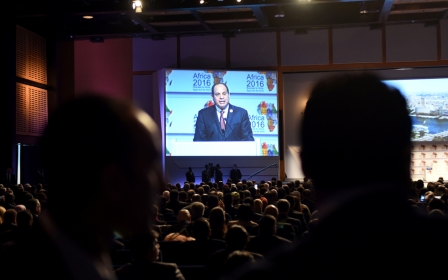From Khaled Saeed to Giulio Regeni: A trajectory of EU weakness

The road to the death of Italian student Giulio Regeni began in Alexandria on 9 June 2010.
The events of that day were to change the course of Egypt’s contemporary history, albeit temporarily, but with local and regional ramifications that will continue for years to come.
That day, after a heated exchange with police informants at an internet cafe, 28-year-old Khaled Saeed was brutally beaten to death in his coastal hometown of Alexandria, Egypt’s second largest city.
An iconic image leaked from the morgue showing Saeed’s unidentifiable, disfigured face, set social media on fire and inspired the "We are all Khaled Saed" virtual movement against the police’s use of excessive violence and torture. Less than seven months later, the movement was instrumental in triggering the January 25 uprising and toppling the Mubarak regime in 18 days.
Fast forward to 25 January, 2016, the fifth anniversary of that pivotal moment when Egyptians called in unison for bread, freedom and social justice in Tahrir Square, and you’ll find a very different city. No longer the epicentre of a revolution, the site of the capital’s highest flagpole is a testament to aborted dreams, a towering symbol of false nationalism and a stark reminder of a perverse reality.
This was also the day that Regeni, an Italian doctoral candidate who was conducting research on post-revolution trade unions and labour issues and was reportedly a fierce critic of the current military-led regime that removed former president Mohamed Morsi in July 2013, was forcibly disappeared, just as police were out en masse to quash any sign of protests to mark the anniversary.
Eight days later, Regeni’s tortured corpse was found half naked in a ditch, sparking global condemnation, and as expected, vehement official denials that Egyptian security forces had anything to do with it. Local and international human rights groups like Amnesty International had been reporting similar atrocities committed against thousands of Egyptians over the past two years.
Too little, too late
It took the European Parliament over one month from the recovery of Regeni’s body to approve, in a simple majority, a resolution against torture in Egypt regarding his case.
In short, too little too late. At best, the resolution, which is non-binding, will go down in history as a welcome rebuke of the regime of President Abdul Fattah al-Sisi.
In order to assess the significance or lack thereof of this resolution, it is important to read it within the context of three previous resolutions - September 2013, February 2014 and January 2015 - and the conclusions adopted by the EU's Foreign Affairs Council meeting in August 2013, one week after what HRW dubbed “one of the world’s largest killings of demonstrators in a single day in recent history” by police and army forces in what came to be known as the Rabaa Massacre.
The first of the Foreign Affairs Council’s 10-point conclusion praised the EU’s close relationship with the Egyptian people and after a mild condemnation for the “disproportionate” use of force resulting in an “unacceptable number of deaths and injuries”, the Council “strongly” condemned “acts of terrorism such as the murder of policemen in the Sinai, the destruction of many churches and the targeting of the Coptic community, attacks on government installations and museums.”
The unconscionable killing of peaceful protesters, which was aired live on television for the world to see, and which claimed 1,000 lives on the most conservative estimate, failed to elicit an European Parliament resolution dedicated to the incident.
The first time Rabaa was even mentioned in a Strasbourg resolution was in a 12 September 2013 text which did not specify a particular incident (as in the case of Guilio Regeni) and which dedicated much of its preamble to the multiple failures of the jailed president Morsi; the “violent” protests of his Muslim Brotherhood supporters which led to “deadly clashes” between protesters and police; the “tragic sectarian violence” that ensued and the “acts of terrorism and violent attacks against security forces in the Sinai”.
Then in the actual recommendation, the resolution does not even “strongly condemn” (it only “condemns”) what it referred to as “the disproportionate use of force by Egyptian security forces during the dismantlement of the Rabaa and Nahda encampments”, merely urging the government to launch an investigation.
By contrast, the resolution continued using much stronger language “deploring” the Brotherhood leadership’s failure to “clearly instruct its political base to refrain from any form of violence against fellow citizens, the army and the police”.
The context in which this resolution was adopted rendered it not only toothless, but ethically questionable, at a moment when it had become irrefutable that the Brotherhood and their supporters had been all but eradicated, their leaders incarcerated or subjected to extrajudicial killings during several incidents that culminated in the 14 August massacre and the harrowing death in custody of 38 protesters in a police truck four days later.
Five months on, in the preamble of the February 2014 resolution on Egypt following the referendum on the new constitution, the European parliament once more seemed to criticise the Brotherhood for “repeatedly [refusing] to participate in the political process” and “inciting to violence against state authorities and security forces”, ironically in the very same article contending that the group’s leaders were imprisoned, its assets seized, its media silenced and its membership criminalised.
It is telling that the section preceding this vehemently drew attention to the widespread violations of fundamental freedoms and human rights in the run-up to the referendum, mentioning by name four imprisoned “secular” political activists and describing their dire conditions of detention in Tora Prison.
Notably, this resolution did not even reiterate the September resolution’s call for “an EU-wide ban on the export to Egypt of intrusion and surveillance technologies which could be used to spy on and repress citizens” as well as “the export of security equipment or military aid that could be used in the suppression of peaceful protest or against the EU’s strategic and security interests”. (It was recently revealed that Finnish, German and Italian companies had in fact sold powerful surveillance technology to a secretive government intelligence agency in Egypt.)
Almost one year later, in a January 2015 resolution, the EP called for the “immediate and unconditional release of all prisoners of conscience” and those detained for their “alleged membership of the Muslim Brotherhood” while failing to condemn the systematic abuse and torture of actual Brotherhood members who, according to tens of recent news reports have been subjected to discriminately inhumane treatment at facilities like the notorious Al-Aqrab prison.
The need for a unified EU stance
It is a truth universally acknowledged that torture at the hands of security forces is systematic in Egypt, and so is the double standard with which its victims are treated both by the perpetrators of these crimes and the international community.
The murder of Regeni is a stark reminder to the EU specifically that Egypt is not on the path to democracy, and that its political and social space has been marred by a hyper-nationalist frenzy that has cultivated an ecosystem of ideas which both condones state violence against political opponents and is conducive to xenophobic attacks on expatriates.
The Regeni resolution will likely fail to affect any real change on the ground despite the fact that the excesses of the Egyptian administration, which EU member states have wholeheartedly embraced, may start posing a real threat to Europe’s security by creating the conditions that foment radicalisation on all sides.
Egged on by the official response, the resolution was used by the witless, populist pro-regime media to escalate a rabid campaign against foreigners which began during the January uprising, accusing them of being part of an international conspiracy to divide the country and destroy it.
The Egyptian regime’s continued use of the war on terrorism as a pretext to galvanise international support is a diversion from its failure to lay the foundations of a true democracy where there is a clear separation of powers between state institutions and where civil and political rights are upheld.
In light of this reality, EU member states must agree on a common strategy and leverage their economic interests against the Egyptian regime. As Egypt's largest trade partner, the EU has the power to put pressure on the government to institute the necessary reforms and demonstrate true will to set up a more inclusive democracy that guarantees the rights of all Egyptians.
The stability of Egypt is a strategic necessity for the EU, which must both agree on and define mechanisms to implement a unified stance that has human rights and fundamental freedoms as its guiding principles in all foreign policies.
Henceforth, the EU’s political and financial support for Egypt should be conditional on political progress with clear penalties to be imposed in case of continued violations that could include trade embargoes; sanctions against specific individuals abusing their official roles and denials of entry to EU territories; the issuance of travel alerts which would deprive the government of much-needed foreign currency.
The duality of the EU’s stance vis-a-vis such glaring injustices, selectively condemning human rights violations on the one hand, and conducting business as usual on the other, will play into the hands of both those who support and oppose the Sisi regime and ultimately weaken the EU’s influence and compromise the security of its citizens.
Egypt is home to hundreds of Khaled Saeeds who came before him and thousands who came after. In January, an Italian citizen became part of that statistic.
The EU can and must make sure this never happens again.
- Rania Al Malky is a Cairo-based columnist and former editor of Daily News Egypt (2006-2012).
The views expressed in this article belong to the author and do not necessarily reflect the editorial policy of Middle East Eye.
Photo: Egyptian youths demonstrate in Cairo on 20 June, 2010 against the killing of alleged torture victim Khaled Saeed (portraits), who was reportedly tortured to death by the police in the northern port city of Alexandria earlier in that month (AFP).
New MEE newsletter: Jerusalem Dispatch
Sign up to get the latest insights and analysis on Israel-Palestine, alongside Turkey Unpacked and other MEE newsletters
Middle East Eye delivers independent and unrivalled coverage and analysis of the Middle East, North Africa and beyond. To learn more about republishing this content and the associated fees, please fill out this form. More about MEE can be found here.





